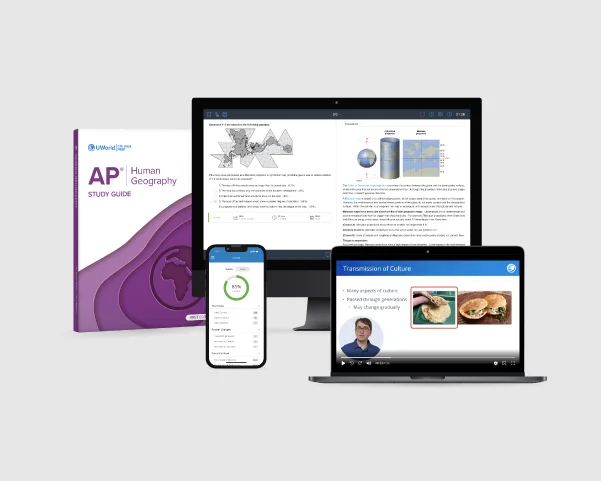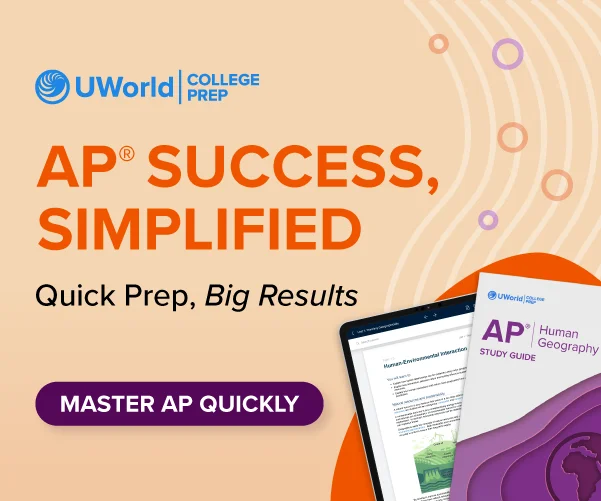Conquer AP Human Geography on your own! With UWorld's resources and a structured approach, you can master complex concepts and ace the exam. This guide will help you effectively use UWorld's study guide, video lessons, and practice questions to build a strong foundation and succeed on test day.
Step 1: Start with UWorld’s AP Human Geography Study Guide for Core Knowledge
When self-studying, a clear and accessible study guide is essential for understanding foundational concepts. UWorld’s AP Human Geography study guide serves as an ideal starting point, providing a well-organized and visually engaging resource to establish a solid foundation.
-
Visually Rich and Updated Content:
Human geography explores diverse topics, from population patterns to urbanization and cultural landscapes. UWorld’s study guide includes detailed visuals, maps, and diagrams that clarify complex ideas, helping you understand topics more effectively. The guide’s alignment with current AP standards ensures that the material you’re studying is both relevant and comprehensive.
-
Logical Structure for Gradual Learning:
The study guide is organized in a logical sequence, starting with basic concepts like map interpretation and progressing to more advanced topics, such as economic development and political organization. This step-by-step approach allows you to build knowledge at a comfortable pace, without feeling overwhelmed.
-
Flexible Format Options for Consistent Study:
Available in both digital and physical forms, UWorld’s study guide provides flexibility for different study environments. Seamlessly transition from reading on your device to using a physical copy, allowing for consistent learning wherever you are.
-
Thorough Without Overwhelming:
While detailed, the guide is focused, covering all essential information without extraneous detail. Use this study guide to build a strong foundation and note any areas that may need additional practice or review.
Step 2: Dive Deeper into Challenging Topics with UWorld’s Video Lessons
After establishing a foundational understanding, you may find that certain topics in AP Human Geography—such as urban models or demographic transition—require a more in-depth exploration. UWorld’s video lessons are designed to make these complex subjects easier to grasp, offering clear and concise explanations.
-
Bite-Sized Videos for Focused Learning:
Each video targets a specific concept, keeping lessons brief and digestible. This structure lets you zero in on one topic at a time, allowing you to watch, pause, and review videos as needed until you fully understand the material.
-
Visually Engaging Explanations:
With animations, illustrations, and real-world examples, UWorld’s videos bring human geography concepts to life. This visual support helps clarify abstract ideas, such as migration patterns and agricultural models, making them more tangible and easier to remember.
-
Experienced Instructors for Clear Insight:
Each video is led by an instructor who breaks down challenging topics in an approachable, student-friendly style. This guidance provides a sense of personal instruction, making complex concepts easier to understand and apply.
Step 3: Test Your Knowledge with UWorld’s Exam-Level Practice Questions
Once you’re comfortable with foundational concepts and have tackled more difficult topics through video lessons, it’s time to put your knowledge to the test. UWorld’s AP Human Geography practice questions mimic the rigor and structure of the actual AP exam, providing valuable practice for exam day.
-
Realistic, Exam-Style Questions:
The practice questions are designed to reflect the AP Human Geography exam format, covering question types like multiple-choice and free-response. This realistic practice helps you become familiar with the exam’s structure, reducing test-day anxiety and boosting your confidence.
-
Detailed Explanations for Each Answer:
UWorld provides in-depth explanations for each answer, clarifying why the correct choice is correct and why other options are incorrect. These explanations help you learn from mistakes and build stronger critical thinking and reasoning skills.
-
Analyze Performance and Focus on Weak Areas:
Regular practice allows you to track your progress and identify topics that may need additional review. If certain types of questions are challenging, revisit the corresponding sections in the study guide or watch specific videos to strengthen your understanding.
Step 4: Reinforce Learning with Personalized Flashcards and Notes
For long-term retention and effective review, create custom flashcards and notes that allow you to revisit key concepts regularly. This practice is particularly valuable for independent study, helping you reinforce what you’ve learned over time.
-
Create Digital Flashcards for Quick Recall:
Use digital flashcard tools like Anki, Quizlet, or UWorld’s flashcard feature to create cards for key terms, geographic models, and significant theories. Reviewing these flashcards regularly will help you recall essential information quickly, especially when studying for the exam.
-
Summarize Key Concepts in Your Own Words:
Writing summaries of each topic in your own language reinforces understanding and makes the material more relatable. Organize your notes by theme or unit, focusing on any areas you find difficult, so you can easily refer back to them during review sessions.
-
Regular Review Sessions for Strong Retention:
Consistent review is essential for reinforcing key information, making it easier to recall on exam day. Dedicate a few minutes each day or week to go over flashcards and notes, ensuring that important concepts stay fresh in your mind.
Tips for Staying Organized and Motivated During Self-Study
Self-studying AP Human Geography requires commitment and discipline, especially without a structured classroom environment. Here are some strategies to stay motivated and organized as you work toward exam success:
-
Set Small, Achievable Goals:
Break down your study plan into manageable weekly goals, such as completing a chapter or answering a set number of practice questions. Achieving these smaller goals will provide a sense of progress and keep you motivated.
-
Organize Your Study Plan with a Planner:
Use a digital or physical planner to log your study sessions, record topics covered, track practice question scores, and note areas needing further review. This organization keeps you focused and helps you see your progress visually.
-
Celebrate Your Milestones:
Self-study can be demanding, so reward yourself when you reach important milestones. Whether it’s finishing a difficult topic or scoring well on a practice set, a small reward reinforces your hard work and keeps motivation high.
-
Connect with Online AP Study Communities:
While self-study means you’re working independently, joining online forums or study groups for AP Human Geography allows you to connect with others, ask questions, and share insights. These communities provide a sense of support and camaraderie, making your study experience more enjoyable.
Conclusion
Self-studying AP Human Geography can be challenging but highly rewarding with the right resources and approach. By following this step-by-step plan with UWorld’s tools, you’ll gain a thorough understanding of the subject, from mastering the basics with the study guide to reinforcing your knowledge with video lessons, practice questions, and personalized notes.
Independent study requires dedication, but UWorld’s resources provide the guidance and structure needed to prepare effectively for the AP exam. Embrace the flexibility of self-study, celebrate your progress, and remember that with patience and perseverance, success on the AP Human Geography exam is well within reach.





